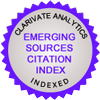Group decision making in best-worst method when the best and worst are not unique: case study of scholar selection
Esra Aytaç Adalı1, Atalay Çağlar21Pamukkale University, Faculty of Economics and Administrative Sciences, Department of Business Administration,Denizli2Pamukkale University, Faculty of Economics and Administrative Sciences, Department of Econometrics, Denizli
Scholarships for the students are the financial supports provided by the government or institutions. There may be a great number of competing applicants with the knowledge, skills and abilities to successfully fulfill the scholarship needs. So, it is difficult to select the most suitable students among multiple applicants for these providers. In this study, scholarship students selection is handled as a complex decision making problem and this problem is solved by integration of two Multi Criteria Decision Making (MCDM) methods, Best-Worst Method (BWM) and COmbined COmpromise SOlution (CoCoSo). In order to demonstrate the applicability of these methods to the scholarship student selection problem, a real problem is solved. This problem is designed as a group decision making problem and BWM, the improved Analytic Hierarchy Process method, is employed to derive the weights of the criteria. A solution to the problem where decision makers best and worst criteria are not common and unique is suggested. On the other hand, CoCoSo method is used for the ranking purposes of the applicants. The novelty of this study is that scholarship selection problem is solved with BWM and CoCoSo methods for the first time. The integrated usage of BWM and CoCoSo methods is thought as suitable and effective methods to rank or select the best candidate or alternative among a number of candidates or alternatives because of satisfactory results.
Keywords: Scholarship student selection, MCDM, BWM, CoCoSoEn iyi ve en kötünün tek olmadığı durumlarda en iyi-en kötü yöntemi ile grup kararı verme: bursiyer seçimine ilişkin vaka çalışması
Esra Aytaç Adalı1, Atalay Çağlar21Pamukkale Üniversitesi,İİBF,İşletme Bölümü, Denizli2Pamukkale Üniversitesi,İİBF,Ekonometri Bölümü, Denizli
Öğrencilere yönelik burslar, devlet veya kurumlar tarafından sağlanan mali desteklerdir. Sağlanan bursun gerekliliklerini başarıyla yerine getirmek için gerekli olan bilgi, beceri ve yeteneklere sahip çok sayıda rakip öğrenci olabilir. Bu nedenle, burs sağlayıcılar için birden fazla başvuru arasından en uygun öğrencileri seçmek zordur. Bu çalışmada, burs seçimi karmaşık bir karar verme problemi olarak ele alınmış ve bu problem, Çok Kriterli Karar Verme (ÇKKV) yönteminlerinden olan En İyi-En Kötü Yöntemi (BWM) ve Birleşik Uzlaşma Çözümü (CoCoSo yöntemi) birlikte kullanılarak çözülmüştür. Bu yöntemlerin burslu öğrenci seçme problemine uygulanabilirliği, gerçek bir problemin çözümü ile gösterilmiştir. Problem, grup karar verme problemi olarak tasarlanmıştır. Problemde kriterlerin ağırlıkları, Analitik Hiyerarşi Süreci yönteminin geliştirilmiş bir hali olan BWM ile hesaplanmıştır. Aynı zamanda, karar vericilerin en iyi ve en kötü kriterlerinin ortak ve tek olmadığı probleme bir çözüm önerilmiştir. Öte yandan, başvuran adayların sıralamaları için CoCoSo yöntemi kullanılmıştır. Bu çalışma ile bursiyer seçim problem, ilk kez BWM ve CoCoSo yöntemleri ile çözülmüştür. Çalışmadan elde edilen tatmin edici sonuçlar, bir dizi aday veya alternatif arasından en iyi adayı veya alternatifi sıralamak ya da seçmek için BWM ve CoCoSo yöntemlerinin birlikte kullanımının uygun ve etkili bir yaklaşım olacağını göstermektedir.
Anahtar Kelimeler: Bursiyer öğrenci seçimi, ÇKKV, BWM, CoCoSoCorresponding Author: Esra Aytaç Adalı, Türkiye
Manuscript Language: English






